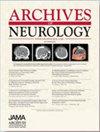Primary progressive aphasia and transient global amnesia.
引用次数: 3
Abstract
W e read with great interest the article by GraffRadford and Josephs describing 3 patients with recurrent episodes of transient global amnesia (TGA) who developed primary progressive aphasia (PPA). In the First Brazilian Symposium on Frontotemporal Dementia in 2007, we described 2 patients with semantic dementia, one of the variants of PPA, who had recurrent episodes of TGA. The first patient, a 66-yearold woman, had 2 episodes of TGA 7 and 6 years before her presentation, with a 2-year history of naming impairment. The second patient, a 75-year-old man, had experienced 3 episodes of TGA 1 year before his presentation, with a 3-year history of naming and reading difficulties. Both patients had never had seizures, and their electroencephalograms did not show epileptic activity. Magnetic resonance imaging revealed severe left temporal lobe atrophy, which was more prominent in the anterior part but also involved the hippocampal formation, in both cases. In the first patient, TGA occurred before the onset of PPA, while in the second patient, language impairment started 2 years before the TGA episodes. In the cases described by Graff-Radford and Josephs, TGA preceded PPA in 2 patients, whereas the reverse occurred in 1. We think our data reinforce the hypothesis that this is not a chance association. Further research is needed to elucidate whether recurrent TGA may predispose to PPA or whether the presence of left temporal or frontal lobe pathology renders patients more susceptible to the disturbance that causes TGA.原发性进行性失语症和短暂性全身性失忆症。
本文章由计算机程序翻译,如有差异,请以英文原文为准。
求助全文
约1分钟内获得全文
求助全文

 求助内容:
求助内容: 应助结果提醒方式:
应助结果提醒方式:


